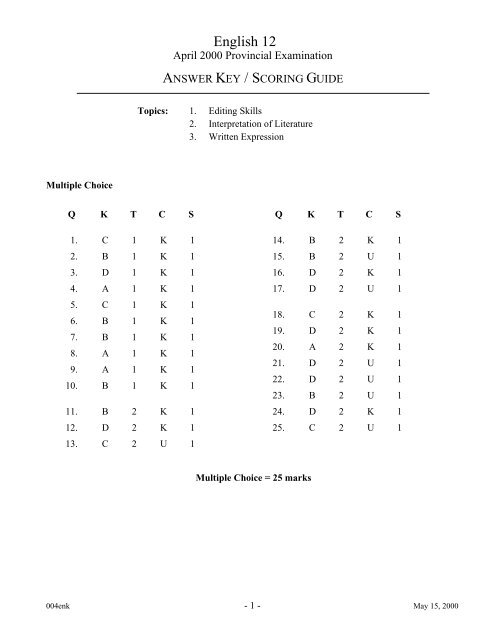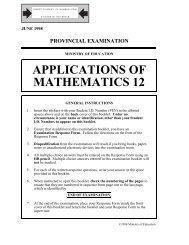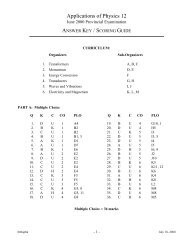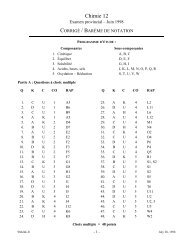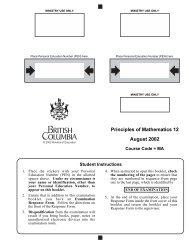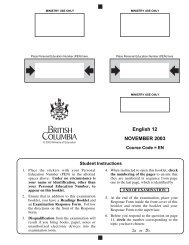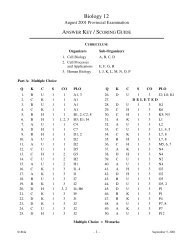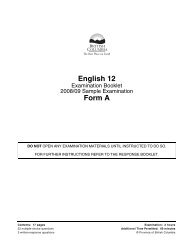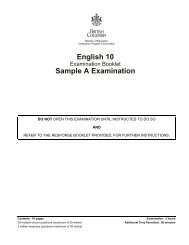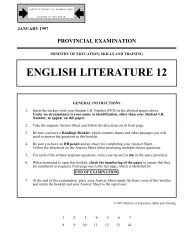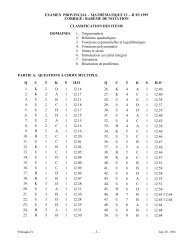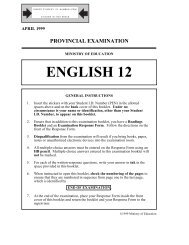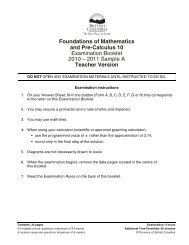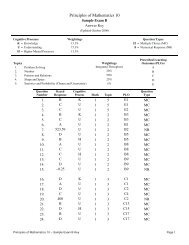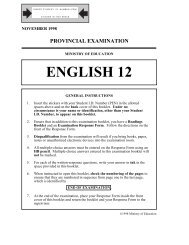English 12 - BC Provincial Exams Practice Questions & Answer Keys
English 12 - BC Provincial Exams Practice Questions & Answer Keys
English 12 - BC Provincial Exams Practice Questions & Answer Keys
You also want an ePaper? Increase the reach of your titles
YUMPU automatically turns print PDFs into web optimized ePapers that Google loves.
Multiple Choice<br />
Q K T C S<br />
1. C 1 K 1<br />
2. B 1 K 1<br />
3. D 1 K 1<br />
4. A 1 K 1<br />
5. C 1 K 1<br />
6. B 1 K 1<br />
7. B 1 K 1<br />
8. A 1 K 1<br />
9. A 1 K 1<br />
10. B 1 K 1<br />
11. B 2 K 1<br />
<strong>12</strong>. D 2 K 1<br />
13. C 2 U 1<br />
<strong>English</strong> <strong>12</strong><br />
April 2000 <strong>Provincial</strong> Examination<br />
ANSWER KEY / SCORING GUIDE<br />
Topics: 1. Editing Skills<br />
2. Interpretation of Literature<br />
3. Written Expression<br />
Multiple Choice = 25 marks<br />
Q K T C S<br />
14. B 2 K 1<br />
15. B 2 U 1<br />
16. D 2 K 1<br />
17. D 2 U 1<br />
18. C 2 K 1<br />
19. D 2 K 1<br />
20. A 2 K 1<br />
21. D 2 U 1<br />
22. D 2 U 1<br />
23. B 2 U 1<br />
24. D 2 K 1<br />
25. C 2 U 1<br />
004enk - 1 - May 15, 2000
Written Response<br />
LEGEND:<br />
Q C T S<br />
1. H 2 <strong>12</strong><br />
2. H 2 24<br />
3. H 2 24<br />
4. H 3 24<br />
004enk - 2 - May 15, 2000<br />
⎫<br />
⎬<br />
⎭<br />
Written Response = 60 marks<br />
Multiple Choice = 25<br />
Written Response = 60<br />
EXAMINATION TOTAL = 85 marks<br />
Score only one of the<br />
two questions given.<br />
Q = Question Number C = Cognitive Level T = Topic<br />
K= Keyed Response S = Score B= Score Box Number
POETRY SCORING GUIDE FOR QUESTION 1<br />
This question tests both the reading and the writing abilities of the student. Your mark must reflect both<br />
the accuracy of the reading, as well as the fluency of the writing.<br />
This guide should be adequate for most papers; however, if you come across a paper that is problematic,<br />
please double-check with the chair or sub-chair. It is essential to remember that this is a draft work; even<br />
high level papers are likely to have the odd error — whether in analysis or writing. Such mistakes should<br />
be considered as part of the paper’s holistic mark, but should not necessarily result in an automatic drop in<br />
the score. However, a paper containing errors so distracting that they impede understanding should not be<br />
given a mark of more than three; a two would be more likely.<br />
Please remember that references to the text may be explicit or implicit. References to lines solely by<br />
number should be ignored.<br />
The high paper tends to recognize and understand the central paradox of the poem.<br />
The middle paper tends to recognize but does not necessarily fully understand the central paradox of the<br />
poem.<br />
The low paper tends to refer to the central paradox of the poem but does not demonstrate significant<br />
understanding. It may also personalize the poem.<br />
Students might recognize that the relationships do not necessarily have to be with people; for example,<br />
Elizabeth’s love for the house.<br />
004enk - 3 - May 15, 2000
6 <strong>Answer</strong><br />
The six response meets all the criteria of a five: its superiority to the five response is a result of degree, not<br />
kind. The level of insight may be particularly convincing and/or subtle or the writing exceptionally<br />
impressive. Certainly the six response exhibits a depth of understanding and a sophisticated use of<br />
language.<br />
5 <strong>Answer</strong><br />
The five response reflects a strong grasp of the topic and the poem. The references to the poem may be<br />
explicit or implicit and convincingly support the student’s point of view. In both understanding and<br />
writing, the paper is proficient. The writing is well organized and reflects a strong grasp of the conventions<br />
of language.<br />
4 <strong>Answer</strong><br />
The four response is competent. Understanding of the poem is accurate but rather superficial or somewhat<br />
incomplete, certainly not imaginative. References are present and suitable, but may be limited to only part<br />
of the poem. The writing conveys the student’s views in an organized, straightforward fashion; errors are<br />
present but generally not distracting. Overall, the student has good control of the conventions of language.<br />
3 <strong>Answer</strong><br />
The three response is barely adequate. While the student’s treatment of the topic may not be wrong, it<br />
may be incomplete or so superficial as to seem inaccurate. While a central idea may not be clearly stated,<br />
it is present or implied and at least partially supported. Support may consist of long references to the poem<br />
which are not clearly connected to a central idea; alternatively, support may be very meager and/or<br />
replaced by repetitive statements. Organization is present, but may not directly help the flow of ideas.<br />
There are lapses in the student’s control over the conventions of language.<br />
2 <strong>Answer</strong><br />
The two response reflects a significant misunderstanding of the poem and/or the task required by the<br />
question. The discussion may be irrelevant, seriously incomplete, or simply wrong. Errors are recurring<br />
and distracting. In some cases, the marker may sense that the student has grasped the essence of the<br />
question but has such deficiencies in language as to render the explanation seriously compromised.<br />
1 <strong>Answer</strong><br />
A one response compounds the problems of the two paper. These papers are often noticeably weaker in<br />
their prose. There is a serious lack of control in the writing; in fact, the marker may wonder, at times,<br />
what the writer is trying to say. Other one papers are little more than a restatement of the topic.<br />
0 <strong>Answer</strong><br />
A response with less than a complete sentence, or written in verse, or a response manifesting an<br />
achievement less than outlined in scale point 1.<br />
A blank paper with no response given.<br />
NR<br />
004enk - 4 - May 15, 2000
PART B: POETRY<br />
The Pigeon, Icarus<br />
(page 1 in the Readings Booklet)<br />
INSTRUCTIONS: In paragraph form and in approximately <strong>12</strong>5 to 150 words, answer question 1 in the<br />
space provided. Write in ink. The mark for your answer will be based on the<br />
appropriateness of the example(s) you use as well as the adequacy of your<br />
explanation and the quality of your written expression.<br />
1. In paragraph form and with reference to the poem, discuss the speaker’s conflicting attitudes<br />
toward the pigeons. (<strong>12</strong> marks)<br />
Suggestions Regarding Response:<br />
The speaker’s positive attitude toward the pigeons:<br />
EXPLANATION REFERENCE<br />
Speaker admires the birds in flight, likening<br />
them to artists.<br />
The speaker views the birds in flight as<br />
beautiful.<br />
Speaker wants to be one of the birds, to join<br />
them in their flight.<br />
Speaker longs for the freedom that the birds<br />
have in flight.<br />
The speaker’s negative attitude toward the pigeons:<br />
EXPLANATION REFERENCE<br />
The pigeons are restricted to their own<br />
cages.<br />
Speaker cannot understand why the pigeons<br />
would give up their freedom each night.<br />
They do not have free choice / free will; they<br />
are always dependent.<br />
Speaker imagines that the birds repress<br />
their longing for freedom, suggesting her /<br />
his own feelings. They only get to dream.<br />
“sweeping together / sculpting skyways”<br />
(lines 5 and 6)<br />
“white to silver / grey to silver” (lines 8 and 9)<br />
“I want to be one of them / rustling up<br />
eddies” (lines 11 and <strong>12</strong>)<br />
“in reckless abandon” (line 15)<br />
“Each night at six the man opens / the small<br />
doors of cages for pigeons” (lines 1 and 2)<br />
“I wonder / why night after night they<br />
forfeit their freedom” (lines 16 and 17)<br />
“muffle longing in attics for what they gave<br />
up” (line 19)<br />
Marks will be awarded for content and written expression.<br />
Refer to the Holistic Scale on pages 3 and 4 of this key.<br />
004enk - 5 - May 15, 2000
PROSE SCORING GUIDE FOR QUESTION 2<br />
This Guide is specific to narrative reading passages. This question tests both the reading and the writing<br />
abilities of the student. Your mark must reflect both the accuracy of the reading, as well as the fluency of<br />
the writing.<br />
This guide should be adequate for most papers; however, if you come across a paper that is problematic,<br />
please double-check with the chair or sub-chair. It is essential to remember that this is a draft work; even<br />
high level papers are likely to have the odd error — whether in analysis or writing. Such mistakes should<br />
be considered as part of the paper’s holistic mark, but should not necessarily result in an automatic drop in<br />
the score. However, a paper containing errors so distracting that they impede understanding should not be<br />
given a mark of more than three; a two would be more likely.<br />
Essays which are not multi-paragraph will be deducted one scale point. Please remember that<br />
references to the text may be explicit or implicit. References to paragraphs solely by number should<br />
be ignored.<br />
High level papers tend to recognize the metaphor and the mixed reaction of the family.<br />
Middle level papers tend to acknowledge the literal and physical aspects of the uprooting.<br />
Low level papers tend to move away from the story and personalize the experience.<br />
004enk - 6 - May 15, 2000
6 <strong>Answer</strong><br />
The six essay meets all the criteria of a five: its superiority to the five essay is a result of degree, not kind.<br />
The level of insight may be particularly convincing and/or subtle or the writing exceptionally impressive.<br />
Certainly the six essay exhibits a depth of understanding and a sophisticated use of language.<br />
5 <strong>Answer</strong><br />
The five essay reflects a strong grasp of the text. The response has a clearly stated thesis which is<br />
convincingly supported. In both understanding and writing, the paper is proficient. The essay reflects a<br />
strong grasp of the conventions of language.<br />
4 <strong>Answer</strong><br />
The four essay is competent. References are present and suitable, but may be limited to only part of the<br />
text. The assertions in the four essay tend to be simplistic. There are no significant errors in reading. The<br />
writing is able to convey the writer’s views in an organized, straightforward fashion; errors are present but<br />
generally not distracting. Overall, the student has good control of the conventions of language.<br />
3 <strong>Answer</strong><br />
The three essay’s response is barely adequate. While the student’s treatment of the topic may not be<br />
wrong, it may be incomplete or so superficial as to seem inaccurate. While a central idea may not be<br />
clearly stated, it is present or implied and at least partially supported. Support may consist of long<br />
references to the prose which are not clearly connected to a central idea; alternatively, support may be very<br />
meager and/or replaced by repetitive statements. Organization is present, but may not directly help the<br />
flow of ideas. There are lapses in the student’s control over the conventions of language.<br />
2 <strong>Answer</strong><br />
The two essay’s response reflects a significant misunderstanding of the prose and/or the task required by<br />
the question. The discussion may be irrelevant, seriously incomplete, or simply wrong. Composition<br />
errors are recurring and distracting. In some cases, the marker may sense that the student has grasped the<br />
essence of the question but has such deficiencies in language as to render the explanation seriously<br />
compromised.<br />
1 <strong>Answer</strong><br />
The one essay compounds the problems of the two essay. These papers are often noticeably weaker in<br />
their prose. There is a serious lack of control in the writing; in fact, the marker may wonder, at times,<br />
what the writer is trying to say. Other one papers are little more than a restatement of the topic.<br />
0 <strong>Answer</strong><br />
A response with less than a complete sentence, or written in verse, or a response manifesting an<br />
achievement less than outlined in scale point 1.<br />
A blank paper with no response given.<br />
NR<br />
004enk - 7 - May 15, 2000
PART C: PROSE<br />
The Uprooting<br />
(pages 2 to 4 in the Readings Booklet)<br />
INSTRUCTIONS: Choose one of the following two topics and write a multi-paragraph response of<br />
approximately 300 words. Write in ink. The mark for your answer will be based<br />
on the appropriateness of the example(s) you use as well as the adequacy of your<br />
explanation and the quality of your written expression. Value: 24 marks<br />
2. In multi-paragraph form and with reference to the story, explain how the title is significant to<br />
the story.<br />
Suggestions Regarding Response:<br />
(24 marks)<br />
Significance: Uprooting creates instability.<br />
The uprooting influences Elizabeth to mature and come to a new realization.<br />
EXPLANATION REFERENCE<br />
The family was uprooted by the war.<br />
The family returns to their house after the<br />
war.<br />
Their house had been changed in their absence<br />
and they were disappointed on returning.<br />
They felt the need to move.<br />
The father had been uprooted from<br />
Ontario, and now he is uprooting his family<br />
to return.<br />
“it could never be the same” (para. 1)<br />
“…the house possessed a strange air.” (para. 1)<br />
“steel engravings” moved (para. 1)<br />
Plush elephant: “He had gone, with the peculiar<br />
tenants”<br />
(para. 1)<br />
The father is delighted to be moving. “Father<br />
was already re-living his youth, spent with<br />
relatives in the Ontario countryside.” (para. 4)<br />
The doll’s house is uprooted. The doll’s house is tagged “Toronto” (para. 5)<br />
Elizabeth is anxious at being uprooted from<br />
her friends.<br />
Elizabeth loses Peggy, who is maturing<br />
faster.<br />
Elizabeth is uprooted from familiarity of<br />
the wide street.<br />
Elizabeth is uprooted from Granny;<br />
Elizabeth is separated from Aunt Maudie,<br />
and Aunt Maudie will feel the loss as well.<br />
“…you could not take people with you” (para. 6)<br />
“Peggy had changed” (para. 7)<br />
“…the familiar shape of the wide street and the<br />
brown boulevard grass looking like a map”<br />
(para. 8)<br />
“those beings who had watched over her like<br />
angels” (para. 8)<br />
004enk - 8 - May 15, 2000
Taxi physically uproots them. “The engine whirred, the car moved forward, backed<br />
up a side street, then tore around to a flying goodbye,<br />
goodbye to Lipton Street.” (para. 18)<br />
Elizabeth was emotionally uprooted. “[she]was a human creature walking alone, with only<br />
her own legs to sustain her, her own arms to pull.”<br />
(para. 19)<br />
Even the geese are uprooted. “…the deep V-wedge of the geese” (para. 20)<br />
The exemplars will provide sample responses.<br />
Marks will be awarded for content and written expression.<br />
Refer to the Holistic Scale on pages 6 and 7 of this key.<br />
004enk - 9 - May 15, 2000
PROSE SCORING GUIDE FOR QUESTION 3<br />
This Guide is specific to narrative reading passages. This question tests both the writing and the reading<br />
abilities of the student. Your mark must reflect both the accuracy of the reading, as well as the fluency of<br />
the writing.<br />
This guide should be adequate for most papers; however, if you come across a paper that is problematic,<br />
please double-check with the chair or sub-chair. It is essential to remember that this is a draft work; even<br />
high level papers are likely to have the odd error — whether in analysis or writing. Such mistakes should<br />
be considered as part of the paper’s holistic mark, but should not necessarily result in an automatic drop in<br />
the score. However, a paper containing errors so distracting that they impede understanding should not be<br />
given a mark of more than three; a two would be more likely.<br />
Essays which are not multi-paragraph will be deducted one scale point. Please remember that<br />
references to the text may be explicit or implicit. References to paragraphs solely by number should<br />
be ignored.<br />
High level papers tend to recognize that Elizabeth already feels a sense of separation before leaving.<br />
Middle level papers tend to concentrate on only the loss of the relationships.<br />
Low level papers tend to personalize the experience, and do not draw from the text.<br />
004enk - 10 - May 15, 2000
6 <strong>Answer</strong><br />
The six essay meets all the criteria of a five: its superiority to the five essay is a result of degree, not kind.<br />
The level of insight may be particularly convincing and/or subtle or the writing exceptionally impressive.<br />
Certainly the six essay exhibits a depth of understanding and a sophisticated use of language.<br />
5 <strong>Answer</strong><br />
The five essay reflects a strong grasp of the text. The response has a clearly stated thesis which is<br />
convincingly supported. In both understanding and writing, the paper is proficient. The essay reflects a<br />
strong grasp of the conventions of language.<br />
4 <strong>Answer</strong><br />
The four essay is competent. References are present and suitable, but may be limited to only part of the<br />
text. The assertions in the four essay tend to be simplistic. There are no significant errors in reading. The<br />
writing is able to convey the writer’s views in an organized, straightforward fashion; errors are present but<br />
generally not distracting. Overall, the student has good control of the conventions of language.<br />
3 <strong>Answer</strong><br />
The three essay’s response is barely adequate. While the student’s treatment of the topic may not be<br />
wrong, it may be incomplete or so superficial as to seem inaccurate. While a central idea may not be<br />
clearly stated, it is present or implied and at least partially supported. Support may consist of long<br />
references to the prose which are not clearly connected to a central idea; alternatively, support may be very<br />
meager and/or replaced by repetitive statements. Organization is present, but may not directly help the<br />
flow of ideas. There are lapses in the student’s control over the conventions of language.<br />
2 <strong>Answer</strong><br />
The two essay’s response reflects a significant misunderstanding of the prose and/or the task required by<br />
the question. The discussion may be irrelevant, seriously incomplete, or simply wrong. Composition<br />
errors are recurring and distracting. In some cases, the marker may sense that the student has grasped the<br />
essence of the question but has such deficiencies in language as to render the explanation seriously<br />
compromised.<br />
1 <strong>Answer</strong><br />
The one essay compounds the problems of the two essay. These papers are often noticeably weaker in<br />
their prose. There is a serious lack of control in the writing; in fact, the marker may wonder, at times,<br />
what the writer is trying to say. Other one papers are little more than a restatement of the topic.<br />
0 <strong>Answer</strong><br />
A response with less than a complete sentence, or written in verse, or a response manifesting an<br />
achievement less than outlined in scale point 1.<br />
A blank paper with no response given.<br />
NR<br />
004enk - 11 - May 15, 2000
3. In multi-paragraph form and with reference to the story, discuss Elizabeth’s relationships with<br />
those she is leaving behind. (24 marks)<br />
Suggestions Regarding Response:<br />
Relationship with Aunt Maudie:<br />
DISCUSSION REFERENCE<br />
Both Granny and Aunt Maudie had taken<br />
care of her.<br />
Aunt Maudie had taught her many things,<br />
played with her, showed her how to<br />
mother.<br />
Aunt Maudie shows Elizabeth that there<br />
may be sides to others of which we are<br />
unaware.<br />
Elizabeth has a sense of isolation from<br />
others.<br />
Relationship with Peggy:<br />
DISCUSSION REFERENCE<br />
She will miss her friends; they are<br />
important to her.<br />
She already seems to have lost Peggy—to<br />
boys, to her home.<br />
Her relationship with Peggy is changing,<br />
prior to the move.<br />
The exemplars will provide sample responses.<br />
“those beings who had watched over her like angels”<br />
(para. 8)<br />
“Aunt Maudie took the warmest interest in her doll<br />
family” (para. 9)<br />
“Aunt Maudie had been a mother, after all; for she<br />
had taught Elizabeth what mothering was like.”<br />
(para. <strong>12</strong>)<br />
“ ‘Promise me you’ll be a good girl, Elizabeth? And<br />
always do what’s right?’ ” (para. 15)<br />
“Elizabeth looked at Aunt Maudie with increased<br />
curiosity.” (para. 13)<br />
“…was a human creature walking alone…”<br />
(para. 19)<br />
“ ‘But I can’t leave Peggy!’ ”(para. 4)<br />
“Peggy had changed. She stayed more at home, now<br />
that Rita had gone off to take her hospital training.<br />
And also, she played more with boys.” (para. 7)<br />
“…it did not seem to upset her to see Peggy staying<br />
on the other side of the street…” (para. 7)<br />
Marks will be awarded for content and written expression.<br />
Refer to the Holistic Scale on pages 10 and 11 of this key.<br />
004enk - <strong>12</strong> - May 15, 2000
PART D: ORIGINAL COMPOSITION<br />
Value: 24 marks Suggested Time: 45 minutes<br />
INSTRUCTIONS: Using standard <strong>English</strong>, write a coherent, unified, multi-paragraph composition of<br />
approximately 300 words on the topic below. In your composition, you may apply<br />
any effective and appropriate method of development which includes any<br />
combination of exposition, persuasion, description, and narration.<br />
Use the page headed Organization and Planning for your rough work. Write your<br />
composition in ink on the pages headed Finished Work.<br />
4. Write a multi-paragraph composition on the topic below. Your response may draw upon any<br />
aspect of your life: your reading, your own experiences, the experiences of others, and so on.<br />
Topic:<br />
The pursuit of freedom involves change.<br />
004enk - 13 - May 15, 2000
SCORING GUIDE FOR ORIGINAL COMPOSITION (PART D)<br />
A composition may apply any effective and appropriate method of development which includes any<br />
combination of exposition, persuasion, description, and narration. No one form of writing should be<br />
considered superior to another. Compositions that are not multi-paragraph will be deducted one<br />
scale point.<br />
6<br />
The 6 paper meets all the criteria for a 5 paper, and it is superior and/or exceptionally engaging. In<br />
addition, the paper may draw upon any number of factors: maturity of style, effectiveness of argument,<br />
use of literary and/or rhetorical devices, depth of discussion, sophistication of wit, or quality of<br />
imagination.<br />
5<br />
The 5 paper is an example of proficient writing. It displays some manipulation of language to achieve a<br />
desired effect. It exhibits a strong voice and clear sense of audience. Content is thoughtful and<br />
interesting. Any errors which are present do not detract from the reader’s understanding. Vocabulary and<br />
sentence structure are varied and serve the author’s purpose successfully.<br />
4<br />
The 4 paper is clearly adequate. The prose is able to convey the writer’s ideas, but without flair or strong<br />
control. Diction and syntax are usually appropriate, but lack variety. Structure, regardless of type, is<br />
predictable and relatively mechanical. The reader has a clear sense of the writer’s purpose, but is not<br />
engaged by the prose. Conventions of language are usually followed, but the reader is aware of errors.<br />
3<br />
The 3 paper is barely adequate. The paper features underdeveloped paragraphs. Transition may be weak<br />
or absent. Support for obvious and simplistic ideas is frequently in the form of listed details. Little<br />
variety in diction and sentence structure is discernible. Although the reader may be aware of some<br />
purpose, errors impede the fluency of the paper.<br />
2<br />
The 2 paper shows familiarity with common spoken language in casual conversation or in the writing of<br />
one not fully conversant with the language. It sustains a subject focus with some unity of direction.<br />
Underdeveloped ideas are simply and/or awkwardly expressed, as they might be in casual conversation.<br />
The paper reflects little knowledge of the conventions of language; errors are frequent and rudimentary.<br />
The reader can perceive meaning and detect a purpose emerging.<br />
1<br />
The 1 paper is compromised by its brevity and its deficiency of composition, content, diction, syntax,<br />
structure, voice and conventions of language as to render its meaning/purpose almost unintelligible.<br />
0<br />
A paper with less than a complete sentence, or written in verse, or a paper manifesting an achievement<br />
less than outlined in scale point 1.<br />
A blank paper with no response given.<br />
NR<br />
END OF KEY<br />
004enk - 14 - May 15, 2000


